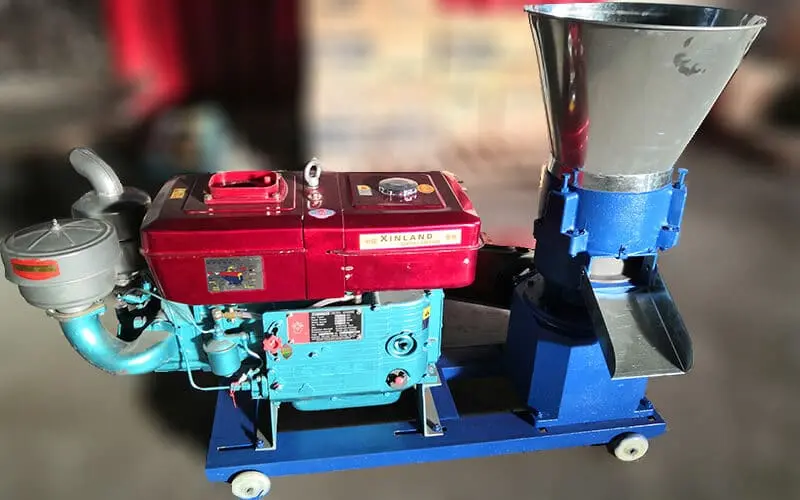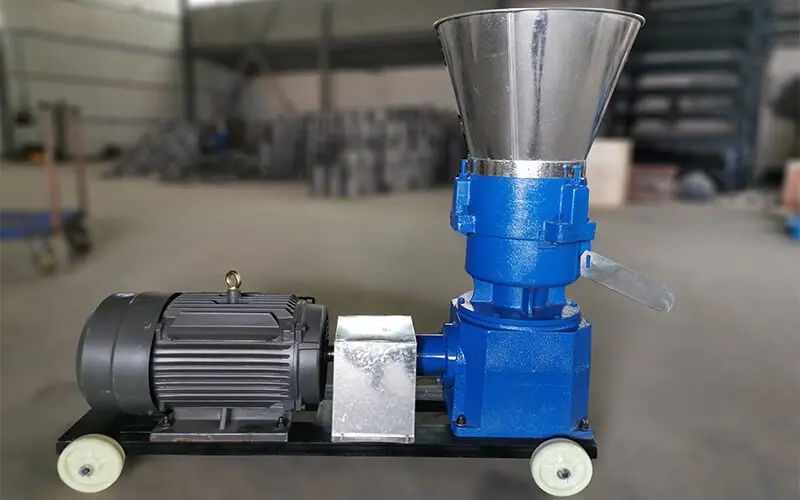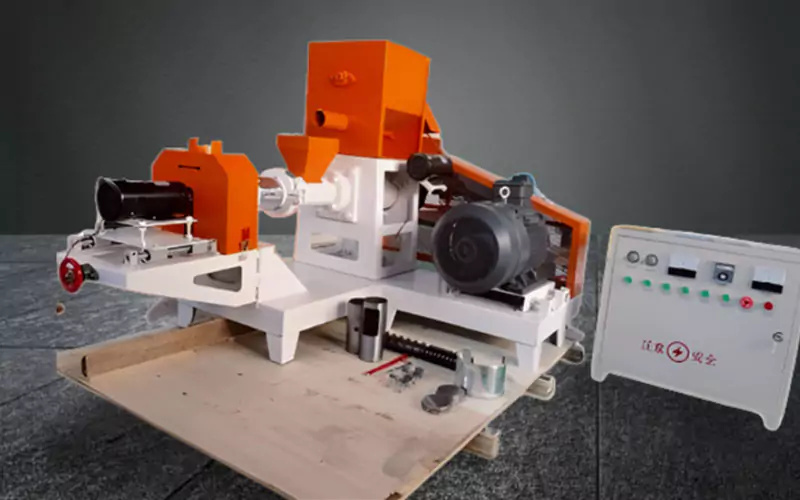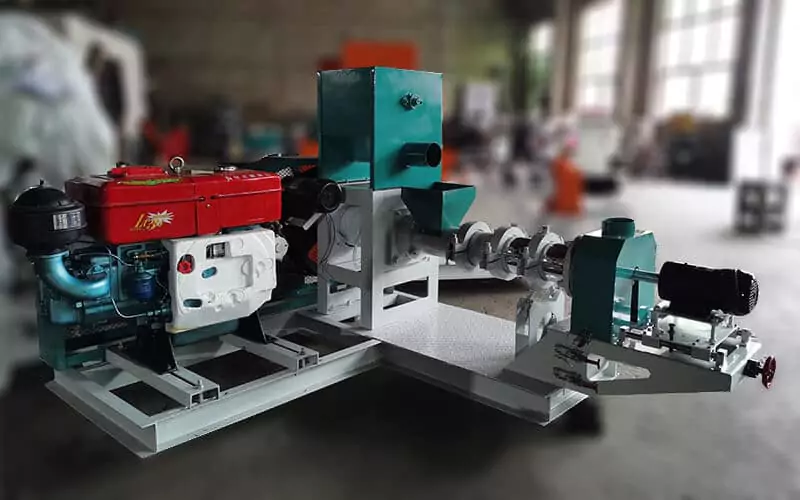Introduction
For farmers across Algeria, especially in the growing aquaculture and poultry sectors, the high cost and variable quality of animal feed is a major challenge. Relying on imported feed can be expensive and the supply is not always certain. The feed pellet extruder machine is a powerful tool for Algerian farmers to take back control. It’s a special type of machine that not only makes pellets but also cooks them. This is essential for making high-quality floating fish feed.
This guide is written for you, the Algerian farmer. We’ll explain what an extruder is, why it’s so important, and the types of machines best suited for local conditions. We will also cover where to find them and what to think about before you invest.
What is a Feed Pellet Extruder Machine?
Think of a feed pellet extruder as a high-pressure cooker that also shapes the food at the same time. It takes a finely ground feed mix. It then uses intense heat and pressure to cook it in just a few seconds. Finally, it forms the cooked dough into pellets as it comes out of the machine.
The most important job of an extruder is to create light, porous pellets that float on water. This is a critical feature for modern fish farming and also improves digestibility for other animals.


Why This Machine is a Smart Choice for Algerian Farmers
Investing in an extruder offers clear advantages for your farm in Algeria.
Lower Your Feed Costs with Local Ingredients.
You can make your own feed using locally available and often cheaper ingredients. These include common Algerian crops and by-products like wheat bran (son de blé), barley (orge), maize (maïs), and even by-products from local industries like olive cake.
Boost Your Aquaculture and Poultry Operations.
This machine is perfect for Algeria’s key growth sectors. Extruded feed leads to better growth for fish like tilapia feed and catfish feed. The cooking process also improves the digestibility of feed for poultry, leading to healthier birds.
Create a High-Value Product.
Extruded feed is often considered a higher quality product. This is because it is cooked, sterilized, and easier for animals to digest. This can give you a competitive advantage in your farming operation.
Start a Local Feed Business.
There is a growing number of fish and poultry farms in Algeria. This gives you an entrepreneurial opportunity. You can supply other farms in your region with high-quality feed that you produce yourself.
The Main Use in Algeria: Making High-Quality Floating Fish Feed
The biggest reason Algerian fish farmers invest in an extruder is to make floating feed. This is especially important for farming tilapia and catfish.
- You can see them eat: Because the pellets float on the surface, you can easily see how much your fish are eating. This helps you to avoid wasteful overfeeding.
- Less waste, cleaner water: The pellets are not lost in the mud at the bottom of the pond. This saves you money on feed. It also helps keep your pond water healthier for your fish.
- Better digestion: The cooking process inside the extruder makes the nutrients in the feed much easier for the fish to absorb. This leads to faster and more efficient growth.
Finding Suppliers in Algeria: Where to Look
Finding a good supplier is a key step.
Major Commercial Hubs: Algiers, Oran, and Constantine.
These cities are the primary centers for importing and distributing industrial and agricultural machinery in Algeria.
Look for Specialized Agricultural Equipment Suppliers (Fournisseurs d’Équipements Agricoles).
It is best to seek out dealers who understand the specific needs of aquaculture and poultry farming, not just general-purpose sellers.
Use Online Marketplaces and Farmer Networks.
You can search on popular Algerian online platforms like Ouedkniss.com. You can also check Algerian farming groups on social media for recommendations from other farmers.
Importing vs. Buying from a Local Dealer.
Buying from a local dealer can offer support and potentially some spare parts. Importing a machine directly might seem cheaper at first. However, it involves complex customs procedures and you will have no local help if there is a problem.


A Practical Checklist for Buying a Machine in Algeria
Think carefully before you buy. Ask yourself these important questions:
What is your power source reality?
“This is a critical question in Algeria. Is the electricity supply in your area stable and do you have a three-phase connection? If not, a diesel engine machine is a much more reliable choice to ensure your business can operate without interruptions.”
What is your required capacity (in kg per hour)?
Match the machine’s output to the size of your farm and your production goals.
Look for a Robust Machine with Simple Controls.
“Getting specialized electronic parts or technicians can be difficult. A strong machine with a simple, durable design is often a better long-term investment in our conditions.”
Ask About the Screw and Barrel Material.
“These are the parts that do all the hard work inside the extruder. They must be made from high-quality, wear-resistant alloy steel to last a long time.”
Ask About Spare Parts.
“Before you pay, ask the supplier in Algiers a key question: ‘If I need a new screw or die, do you have it in stock here in Algeria, or does it have to be imported? How long will it take to get?’ The answer is very important for your business.”
Cost & Financing Considerations in Algeria
- Price is Often in Euros or US Dollars. You should be aware that for this type of imported machinery, the price is often set in a foreign currency (like Euros or USD). It is then converted to Algerian Dinars (DZD). A small-scale extruder will cost a significant amount. It is absolutely necessary to get direct, current quotes from suppliers.
- Looking for Financing Options.
- You can inquire about agricultural or SME (Small and Medium-sized Enterprises) loans from Algerian banks.
- It is a very good idea to check with the Banque de l’Agriculture et du Développement Rural (BADR). This is the primary bank for supporting the agricultural sector in Algeria.
Conclusion
For Algerian farmers, a feed pellet extruder is a key investment for modernizing their farm, especially in the aquaculture sector. It helps you control costs, improve feed quality, and build a more profitable business. While it requires careful planning, taking control of your feed production is a powerful step towards success in Algeria’s growing agricultural industry.
FAQ About Feed Pellet Extruder Machine in Algeria
What is the main difference between an extruder and a regular pellet mill?
A: An extruder cooks and expands the feed under high pressure to make it light and float on water. A regular feed pellet mill simply compresses the feed to make a dense, sinking pellet. For floating fish feed, you must use an extruder.
Is a diesel or electric machine a better choice for a farm in Algeria?
A: A diesel engine model is often a safer and more reliable choice for many farmers in Algeria. This is due to potential inconsistencies in the public power supply. If you are in a city with a very stable power grid, an electric model can be cheaper to run.
What are some good, low-cost ingredients for fish feed available in Algeria?
A: This depends on your region, but common and cost-effective ingredients can include by-products from local agriculture. These include wheat bran (son de blé), barley (orge), and by-products from the local olive oil industry.
Do I need a very big extruder to start a small fish farm?
A: No, you do not. There are many small-scale fish feed extruders available on the market. These are designed specifically for smallholder farmers or for those starting a new aquaculture business. They are much more affordable than the large, industrial machines.
Where is the best place to start looking to buy a machine in Algeria?
A: A good place to start your search is with established agricultural and industrial equipment dealers in the major commercial cities, especially Algiers and Oran.

